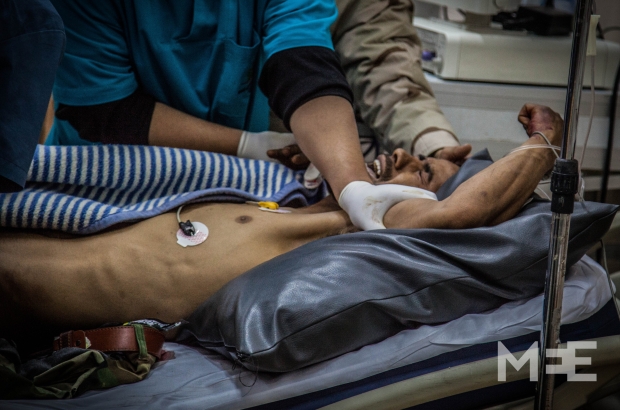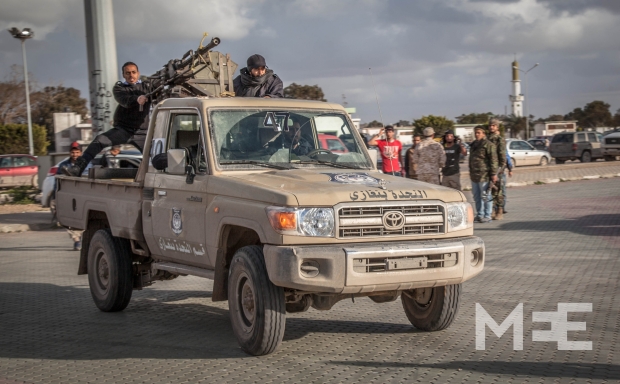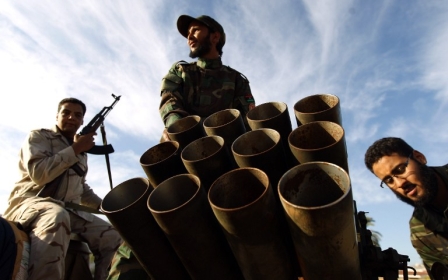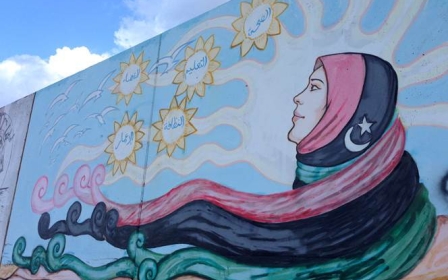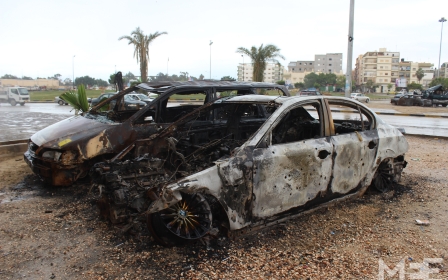A journey into Benghazi's 'liberated' districts
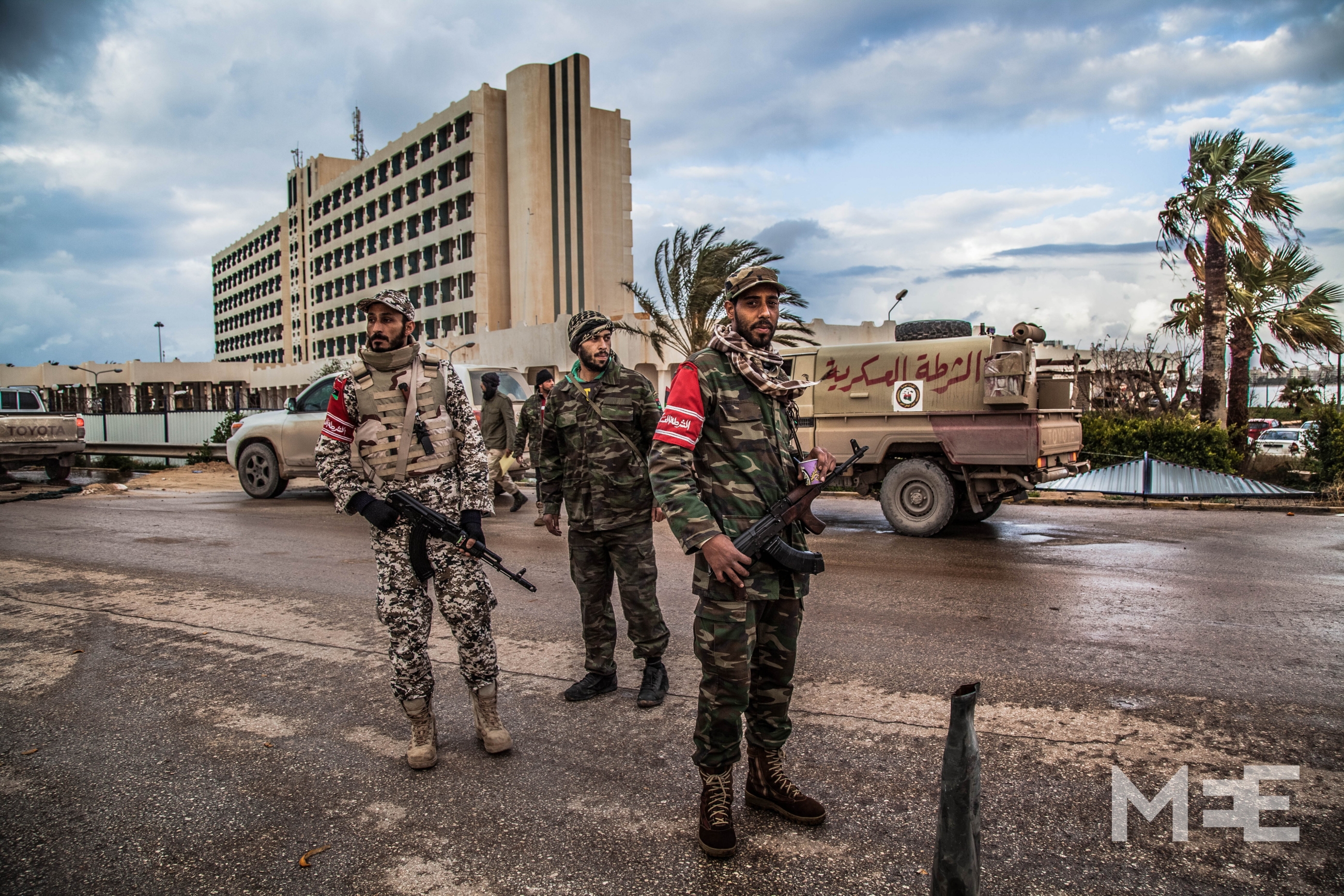
“This uniform is my pride and dignity,” says Major al-Hijazi while driving through Benghazi’s “liberated” districts.
Only a year ago it would have been suicidal for Mohamed al-Hijazi or any other member of Libya’s armed forces to be seen in Benghazi with their treasured uniforms on. The city has been under the control of radical Islamist groups for most of the time following the 2011 revolution that toppled former leader, Muammar Gaddafi. Officers of both the police and army were constantly targeted by Islamist militants, whether by rigging cars or drive-by shootings. Hundreds of soldiers were killed.
Major al-Hijazi is the spokesman for Lieutenant General Khalifa Haftar’s “Operation Dignity”. The operation that commenced in May last year sought to rid Libya of radical Islamists, “terrorists” as most of Libya’s army would call them.
“We are fighting them for the world,” says Hijazi, “this is not just Libya’s war. The message to Europe from terrorist groups in Sirte was very clear when they executed the Egyptians on the shore of Libya: ‘We’re at your gates and you’re next.’”
Hijazi once was a prisoner in his own home. “If you walked on the street with a uniform on, you would be killed,” he said of 2013, speaking from his apartment tucked away inside Benghazi’s many small broken sidestreets.
Meeting anyone in public was not a risk he could take back then. But now he parades the main shopping avenue of Libya’s second city as a hero. Although surrounded by security guards, he is greeted by all. Children kiss his cheeks and run up to shake his hand. Men offer him coffee and line up for a picture next to the face that represents what they see as their national army.
“They love their army,” says Hijazi, “they see us as their saviours, and by greeting me, they greet the Libyan army.”
Benghazi was where Islamist militants were the most embedded; in a matter of three years, along with dozens of activists and members of the judiciary system, over 300 members of Libya’s armed forces were assassinated by extremist militants.
“No one else has seen such terror,” explains Hijazi, who believes the only reason some in the country opposed the army and their operations is because they haven’t yet seen what these extremists are capable of doing. “People in other towns have not seen terrorists the way Benghazi has.”
Operation Dignity is now entering its tenth month, and although Haftar’s men have made massive progress in Benghazi, the fight still continues. “The biggest problem are snipers,” says Hijazi. He explains that the militants have been there for so long, they’re well positioned and difficult to deal with in such tight streets.
In al-Jalaa hospital, yet another of the army’s men is rushed in after being shot by a sniper. The man cries out while medics try to treat his injuries. In the bed next to him, a fighter from a different front line tries to comfort him, telling him to scream and reminding him to thank God that he’s still alive.
Battles rage on near the port where Shwehdi was injured and at the western entrance to the city. Every night, loud explosions can be heard all around Benghazi, followed by heavy machine-gun fire. For some who live closest to the front line, it’s merely a fireworks show, at least that’s what Fatheia tells her four-year-old son.
“It’s easier if he doesn’t know,” she says. “He gets scared so easily.”
Her family lives on the last street - seen as a grey zone between the army-controlled neighbourhoods, and the front line, a no-go zone for most civilians. “Only we - families who live on the street - are allowed in,” says Fatheia. A sunset curfew has also been set, and anyone arriving after that is not allowed back in.
The army has set checkpoints at roughly a 10-block perimeter, and Fatheia’s home is at the last block before the fighting. The streets there are flooded because of sewage pipes that burst, and almost every building is damaged by bullets.
For her four-year-old, she doesn’t have any worries as long as he thinks it's a game. “It’s my daughter I’m concerned about. She’s only seven, but she knows what’s going on,” Fatheia explains.
When with her friends they ask her if she’s with the army or Ansar Sharia, [an Islamist militia in Benghazi], a question asked by almost everyone, whether a soldier at a checkpoint to people passing or just at home with friends. But Fatheia prefers that she and her children distance themselves from politics. She tries to shield them from the conflict around them.
Most people say they do feel at peace in Benghazi now that the army is in control, and believe things are heading in the right direction. Masoud is an engineer at Libya’s National Oil Corporation, and is a father of three. His children have been home-schooled ever since the war in Benghazi began. But Masoud sees this as a positive move from the army.
“Before the army took control, I would worry whenever I would take my children out,” says Masoud, seated with his wife and kids. His eldest daughter sings a song of heroism and victory. Masoud talks about the fears he faced whenever he would go out before the army came in. He says that sometimes while parked at traffic light, he would just brace himself for the car next to him to explode: “You never know when it might happen,” he said. “Three cars were rigged on my street alone in the last year.”
But fear of incursions by the militants hasn't gone away. While parked outside a mosque, artillery shells erupt. “It’s the army firing out towards the militias,” says a member of Hijazi’s security team. It’s only just down the block and they worry that return fire may reach Hijazi’s location. Before they rush off, a man grabs Hijazi’s hand and requests a word.
“I want to report someone who I think is Ansar Sharia,” says the old man. He gives a detailed description to Hijazi, and the man’s address. Hijazi says they are getting hundreds of reports. “We try to look into all of them,” he says, but explains that they have to be careful. “Some people just have grudges,” says Hijazi, and what easier way to rid themselves of a foe than to report him as a terrorist in Benghazi?
The threat of an attack is very real though. In a Friday protest, while people chant and hold signs in support of the army, a bang and a plume of dust in the air draws everyone’s attention. Army and police cars speed towards the explosion.
Although Benghazi was where Libya’s Arab Spring revolution began, the city missed out on much of the violence in 2011. It has, however, borne the brunt of the civil war since the country was announced “liberated” after Gaddafi’s death in October of that year. Masoud believes that, throughout history, Benghazi has been the first to act. “It happens here, then the rest of the country follows,” he says, “just like in the 2011 revolution.”
Walking the streets of Benghazi, Hijazi speaks of sleeper cells in Tripoli and West Libya. “They will become operational once we have taken Benghazi.”
He says it’s just a matter of a weeks. Fatheia still wonders how much longer it will be before her youngest’s firework shows are over.
New MEE newsletter: Jerusalem Dispatch
Sign up to get the latest insights and analysis on Israel-Palestine, alongside Turkey Unpacked and other MEE newsletters
Middle East Eye delivers independent and unrivalled coverage and analysis of the Middle East, North Africa and beyond. To learn more about republishing this content and the associated fees, please fill out this form. More about MEE can be found here.


